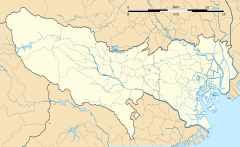Daimon Station (Tokyo)
A09 E20 Daimon Station 大門駅 | ||||||||||||||||||||
|---|---|---|---|---|---|---|---|---|---|---|---|---|---|---|---|---|---|---|---|---|
 Asakusa Line ticket gates, 2018 | ||||||||||||||||||||
| General information | ||||||||||||||||||||
| Location | 1-27-12 (Asakusa Line) 2-3-4 (Oedo Line) Hamamatsuchō District, Minato City, Tokyo Japan | |||||||||||||||||||
| Operated by | ||||||||||||||||||||
| Line(s) | ||||||||||||||||||||
| Platforms | 2 side platforms (Asakusa Line) 1 island platform (Ōedo Line) | |||||||||||||||||||
| Tracks | 4 (2 for each line) | |||||||||||||||||||
| Connections | JK23 JY28 MO01 Hamamatsuchō | |||||||||||||||||||
| Construction | ||||||||||||||||||||
| Structure type | Underground | |||||||||||||||||||
| Other information | ||||||||||||||||||||
| Station code |
| |||||||||||||||||||
| History | ||||||||||||||||||||
| Opened | 1 October 1964 | |||||||||||||||||||
| Services | ||||||||||||||||||||
| ||||||||||||||||||||
| ||||||||||||||||||||
Daimon Station (大門駅, Daimon-eki) is a subway station in Minato, Tokyo, Japan, operated by the Tokyo subway operator Toei Subway. The station is named after the Shiba Daimon or Great Gate of Shiba, located just west of the station on the road leading to the temple of Zōjō-ji.
Daimon is adjacent to Hamamatsuchō Station, which is served by JR East and the Tokyo Monorail. On the Toei lines, Daimon is called "Daimon Hamamatsucho" in certain automated announcements. The Oedo Line station, which occupies most of the space between the Asakusa Line and the JR lines, was initially planned to be called "Hamamatsucho", but ultimately adopted the name of the existing Asakusa Line station.[citation needed]
Lines
[edit]- Toei Asakusa Line (Station A-09)
- Toei Ōedo Line (Station E-20)
Station layout
[edit]The Asakusa Line station has two side platforms. The Oedo Line station has one island platform.
Platforms
[edit]| 1 | A Asakusa Line | for Sengakuji and Nishi-magome KK Keikyu Main Line for Shinagawa, Haneda Airport (International Terminal and Domestic Terminal) and Misakiguchi |
| 2 | A Asakusa Line | for Nihombashi and Oshiage KS Keisei Main Line for Keisei-Takasago, Keisei-Tsudanuma and Narita Airport (Terminal 2·3 and Terminal 1) HS Hokuso Line for Imba Nihon-idai KS Narita Sky Access Line for Narita Airport SR Shibayama Railway Line for Shibayama-Chiyoda |
| 3 | E Ōedo Line | for Ryogoku and Iidabashi |
| 4 | E Ōedo Line | for Roppongi, Tochomae, and Hikarigaoka |
-
Asakusa Line platform, 2020
-
Oedo Line platforms, May 2018
History
[edit]The station was opened on 1 October 1964 as a station on the Toei Subway Line No. 1, which would later become the Asakusa Line. On 12 December 2000, service on the Oedo Line began.
Passenger statistics
[edit]In 2012,[1] the Asakusa Line station was used by an average of around 91,000 arriving and departing passengers per day,[2] while the Oedo Line station was used by an average of around 114,000.[3]
References
[edit]- ^ https://www.train-media.net/report/1310/joukou_1310.pdf (pages 63, 66)
- ^ "各駅情報". Bureau of Transportation, Tokyo Metropolitan Government. Archived from the original on 19 December 2013. Retrieved 19 December 2013.
- ^ "各駅情報". Bureau of Transportation, Tokyo Metropolitan Government. Archived from the original on 19 December 2013. Retrieved 19 December 2013.






